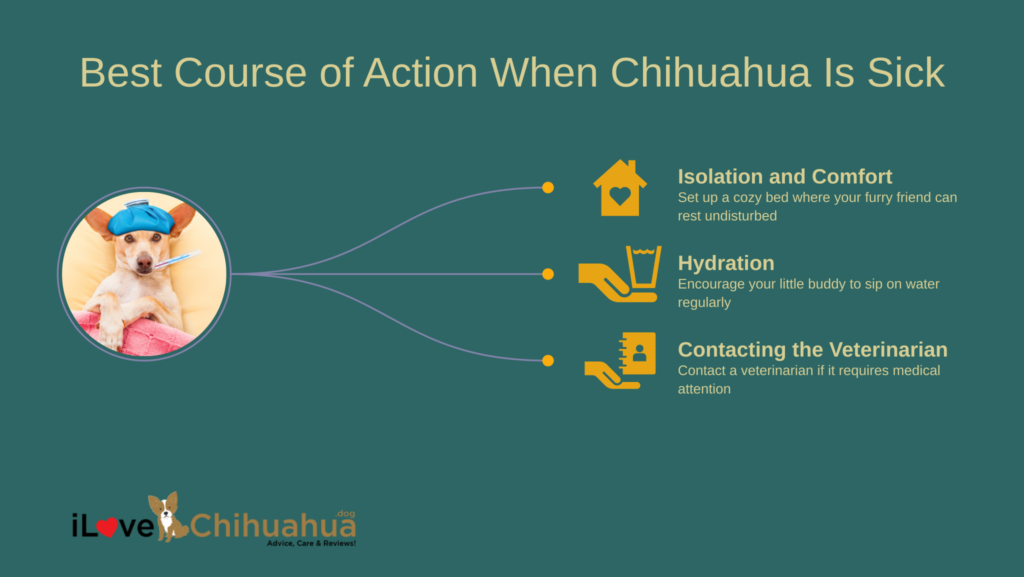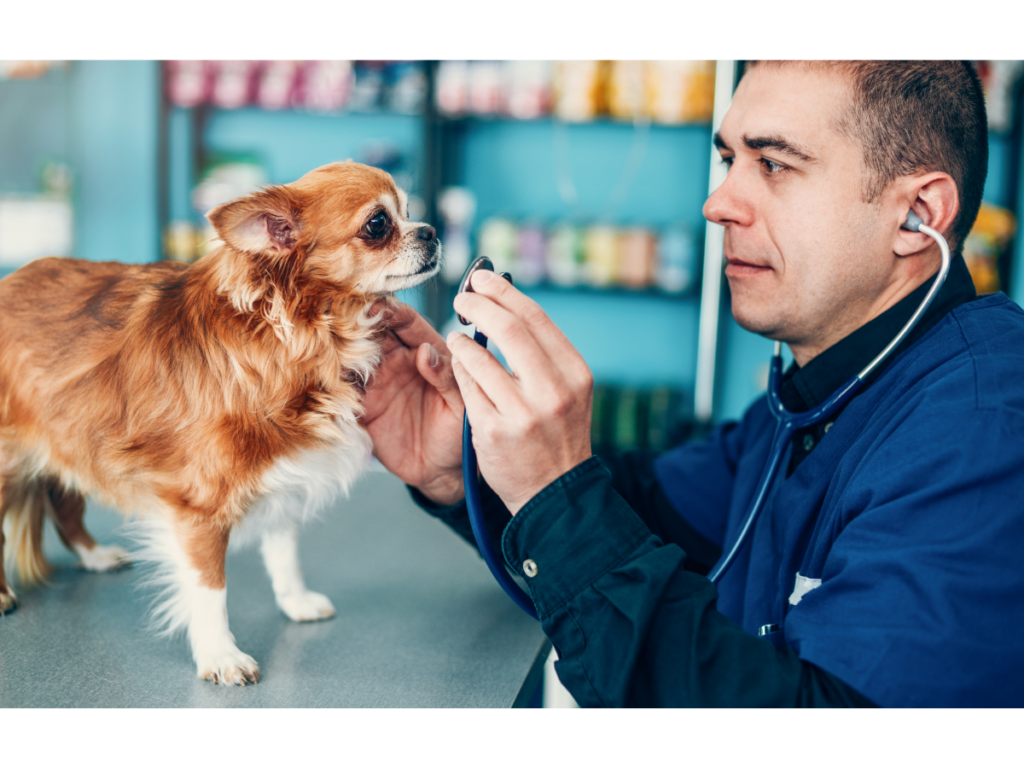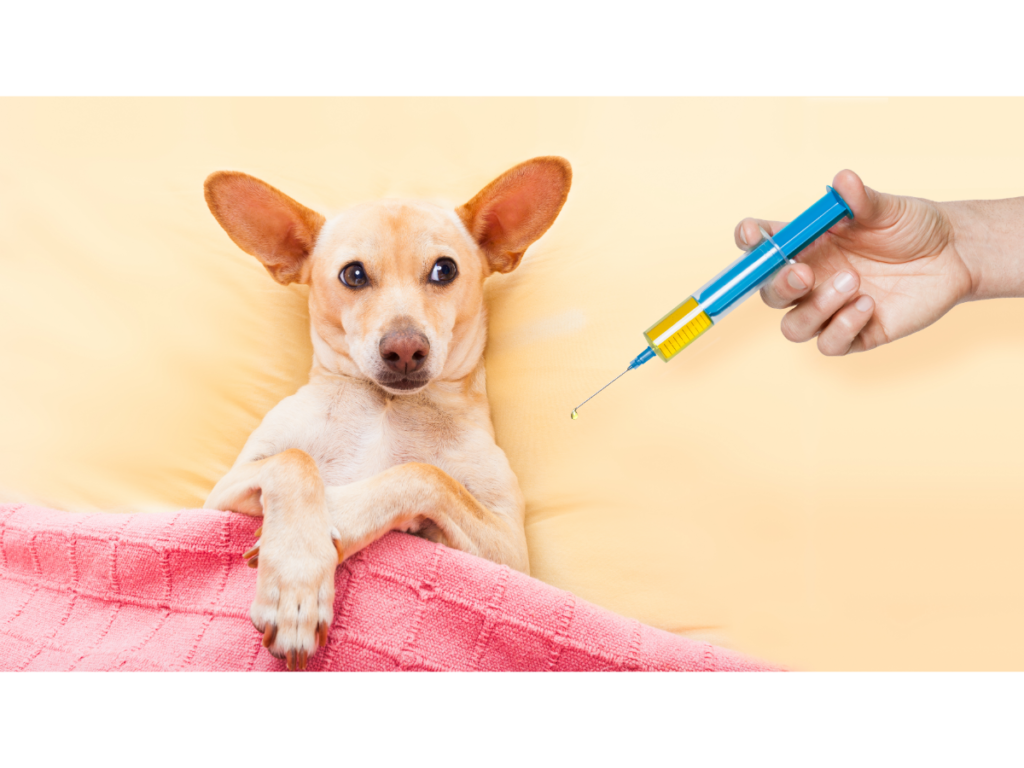Does your Chihuahua act differently lately? Not his usual cheerful self? And you’re wondering, what to do when chihuahua is sick? If your pet appears unwell, you may feel concerned and unsure of what to do. Responsible pet owners should understand how to deal with Chihuahua health issues.
Chihuahuas have off days. Pets can’t communicate pain like humans. Thus, we must observe their behavior and condition. Chihuahua illness symptoms and treatment can severely affect your pet’s health.
The next sections will give tips for treating a sick Chihuahua. We cover routine upkeep and regular vet visits to provide your pet with the best care. Let’s begin!
Signs that Your Chihuahua Might Be Sick

We must monitor our Chihuahuas’ behavior and behaviors as pet owners. Any changes or anomalies may signal a health problem. Common indicators of a sick pet include:
❗Strange Unusual Behavior
Chihuahuas are very active. Rapid changes in behavior, such as lethargy or decreased activity, may indicate disease. Your dog’s sudden aggression or irritability may also suggest a problem. Monitor your dog’s behavior; extreme changes should be taken seriously.
❗Changes in Diet and Drink
When sick, dogs lose their appetite like people. If your Chihuahua eats less or doesn’t want food, it may be sick. Excessive thirst might potentially indicate diabetes or renal damage. Monitor your Chihuahua’s eating and drinking habits to spot problems early.
❗Physical Appearance and Discomfort
Watch for Chihuahua physical changes. Unexpected weight loss, dull coat, red or watery eyes, or stool consistency changes may indicate sickness. Watch for pain if your Chihuahua scratches excessively, limps, or has trouble getting up. These might indicate skin, joint, or other health concerns.
❗Breathing Issues
Breathing problems in your Chihuahua indicate a problem. Take your pet to the vet if you hear wheezing, coughing, or hard breathing.
Trust your instincts—you know your Chihuahua best. When in doubt, visit a vet. Your Chihuahua needs you to advocate for its health. Be vigilant and proactive.
What to Do When Chihuahua Is Sick: Immediate Steps to Take

If you suspect your Chihuahua is sick, the best course of action is to take it to the vet immediately. Early intervention can significantly affect treatment outcomes for many health issues.
🐾Isolation and Comfort:
When your Chihuahua feels under the weather, creating a snug and peaceful sanctuary is time. Find a quiet corner or set up a cozy bed where your furry friend can rest undisturbed. This provides them with a sense of security and helps reduce stress during their recovery.
Additionally, consider limiting their interactions with other pets. This precautionary step prevents the potential spread of illness among your furry family members. It’s like giving your Chihuahua a VIP pass to a private, germ-free zone.
🐾Hydration:
Just like us, staying hydrated is key for your Chihuahua’s recovery. Encourage your little buddy to sip on water regularly. A hydrated pup is a happier pup! If your Chihuahua isn’t keen on drinking, you can sweeten the deal by offering ice chips or electrolyte solutions. Think of it as a refreshing beverage to boost their energy levels.
Remember, hydration plays a crucial role in their recovery journey, so keep those water bowls filled and enticing.
Contacting the Veterinarian

Knowing when to contact a veterinarian for your Chihuahua’s health concerns is important. The following points will help you identify emergencies and specific symptoms that require immediate attention:
📝Identifying Emergency Situations
If you notice any of the following signs in your Chihuahua, it’s crucial to seek veterinary care immediately:
- Difficulty breathing or gasping for air
- Seizures or convulsions
- Profuse bleeding that doesn’t stop
- Unconsciousness or extreme lethargy
- Inability to urinate or defecate
- Severe injuries, such as fractures or deep wounds
These are just a few examples of emergency situations requiring prompt veterinary assistance. Trust your instincts and prioritize your Chihuahua’s well-being.
📝Noting Specific Symptoms that Require Immediate Attention
Certain symptoms in Chihuahuas may indicate a serious underlying problem. If your Chihuahua exhibits any of the following symptoms, it’s crucial to contact your veterinarian:
- Persistent vomiting or diarrhea
- Loss of appetite or refusal to eat for more than 24 hours
- Excessive drooling or foaming at the mouth
- Sudden weight loss or gain
- Limping, favoring a particular leg, or showing signs of pain
- Abnormal urination patterns or blood in urine
- Excessive scratching, redness, or sores on the skin
If you observe these symptoms in your Chihuahua, it’s best to consult a veterinarian promptly. They can provide accurate diagnosis and appropriate treatment.
📝Documenting Symptoms and Changes in Behavior
Keep a record of any symptoms or changes in behavior that you have observed in your Chihuahua. This can include:
- Noticeable changes in appetite, thirst, or urination patterns
- Vomiting, diarrhea, or any abnormalities in bowel movements
- Coughing, sneezing, or difficulty breathing
- Lethargy, excessive sleepiness, or restlessness
- Changes in coordination or mobility
- Unusual vocalization or excessive barking
- Any other abnormal behaviors or signs of discomfort
By providing a detailed account of these symptoms, your veterinarian can better understand your Chihuahua’s condition.
📝Mentioning Recent Changes in Diet or Environment
Inform your veterinarian about recent changes in your Chihuahua’s diet or environment. This can include:
- Switching to a new brand or type of food
- Introducing new treats or supplements
- Any exposure to toxic substances or plants
- Changes in household routine or surroundings
- Travel or exposure to other animals
These details can help your veterinarian pinpoint potential factors contributing to your Chihuahua’s health issues.
Taking Care of a Sick Chihuahua
So, what steps can you take at home to help your Chihuahua if they show signs of pain or discomfort? Here are some helpful tips for common ailments:
➥Upset Stomach
An upset stomach can leave your teenager feeling miserable. To provide relief and support their recovery, follow these steps.
1: Fasting and reintroducing bland foods
When your teenager experiences an upset stomach, it’s best to give their digestive system a break by fasting them for a short period. It means refraining from giving them solid foods while allowing them to drink small sips of clear fluids like water or electrolyte solutions. After a few hours without vomiting, you can gradually reintroduce bland, easily digestible foods such as plain rice, boiled potatoes, or toast. These foods can help calm the stomach and provide essential nutrients.
2: Monitoring for improvement or worsening symptoms
While your teenager is recovering from an upset stomach, it’s crucial to closely monitor their symptoms. Keep an eye out for any signs of improvement, such as decreased nausea, less frequent vomiting, or increased appetite. Conversely, if their symptoms worsen or persist for an extended period, it may be necessary to seek medical attention. Trust your instincts as a parent and consult a healthcare professional when needed.
➥Respiratory Issues
Respiratory issues like coughs, colds, or allergies can make your teenager feel miserable. Here’s how you can provide home care for respiratory issues:
1: Keeping the environment clean and free of irritants
Maintaining a clean environment is essential for respiratory health. Regularly dust and vacuum the house to remove allergens and irritants. Keep the air indoors as clean as possible by using high-efficiency particulate air (HEPA) filters in your home’s ventilation system or using standalone air purifiers. Additionally, avoid smoking or exposure to secondhand smoke, which can worsen respiratory symptoms.
2: Using a humidifier to ease breathing
Dry air can aggravate respiratory symptoms and make breathing more difficult. Consider using a humidifier in your teenager’s bedroom, especially at night when symptoms worsen. A humidifier adds moisture to the air, helping to soothe irritated airways and ease congestion. Be sure to clean the humidifier regularly to prevent the growth of mold or bacteria.
By providing home care for common ailments such as upset stomachs and respiratory issues, you can help your teenager feel better and recover faster.
Medication and Treatment

If your Chihuahua is experiencing severe pain or discomfort, it may be necessary to consider medication or treatment options. Always consult your veterinarian before administering any medication to your Chihuahua, as some human medications can harm pets. Your vet may prescribe antibiotics for infections or anti-inflammatories for pain and inflammation.
💊Administering Prescribed Medications
Administering medications to your Chihuahua requires attention to detail and understanding. Here are two key factors to consider:
→Understanding Dosage and Frequency
It is vital to understand the correct dosage and frequency of your Chihuahua’s prescribed medications. The dosage is the specific amount of medication to be given each time, while the frequency refers to how often it should be administered. Carefully read the instructions provided by your veterinarian and follow them precisely. If you have any doubts or concerns, do not hesitate to reach out to your veterinarian for clarification.
→Ensuring Proper Administration Techniques
Proper administration techniques are essential to ensure that your Chihuahua receives the medication’s full benefit. Here are a few tips to keep in mind:
- Use the recommended method of administration, such as oral pills, liquid suspensions, or topical applications.
- Administer medications at the same time every day to maintain consistency.
- Follow any specific instructions regarding food restrictions before or after medication administration.
- Be gentle and patient with your Chihuahua during the process, providing treats or rewards to make it a positive experience.
By understanding the dosage and frequency, and following proper administration techniques, you can effectively provide your Chihuahua with the medication they need.
💊Follow-up Appointments
Follow-up appointments with your veterinarian are crucial to monitor your Chihuahua’s progress and adjust their treatment plan accordingly. Here are two important considerations:
→Scheduling and Attending Vet Appointments
It is essential to schedule and attend regular vet appointments as recommended by your veterinarian. These appointments allow the vet to assess your Chihuahua’s condition, evaluate the effectiveness of the medication, and make any necessary adjustments to the treatment plan. Be proactive in scheduling these appointments and ensure that you are punctual and prepared for each visit.
→Updating the Vet on the Chihuahua’s Progress
During follow-up appointments, update your veterinarian on your Chihuahua’s progress and any changes you have observed since the previous visit. This includes information about their response to medication, improvements in symptoms, or any concerning side effects. Open communication with your veterinarian helps them make informed decisions about your Chihuahua’s ongoing treatment.
You can provide the necessary care and support for your furry friend by administering prescribed medications correctly and attending follow-up appointments.
Preventive Measures to Keep Your Chihuahua Healthy
As the saying goes, prevention is better than cure. As a responsible Chihuahua owner, it is crucial to take preventive measures to keep your furry friend healthy and happy. Here are some essential tips:
✅Maintaining a Healthy Diet
A proper diet is fundamental to your Chihuahua’s health and can significantly contribute to preventing illnesses. Here are some key points to consider:
- Choosing Nutritious Food: Selecting high-quality dog food that is specifically formulated for small breeds like Chihuahuas is essential. Look for products that contain lean protein sources, whole grains, healthy fats, and essential vitamins and minerals. Avoid foods with excessive fillers or artificial additives, which may negatively impact your Chihuahua’s health.
- Portion Control and Feeding Schedule: Proper portion control is crucial to maintaining a healthy weight for your Chihuahua. Overfeeding can lead to obesity and related health issues. Follow the feeding guidelines provided by the manufacturer based on your Chihuahua’s age, size, and activity level. Establish a consistent feeding schedule to regulate their meals and avoid unnecessary snacking.
✅Regular Exercise Routine
Regular exercise is vital for your Chihuahua’s physical and mental well-being. Here’s how you can incorporate exercise into their routine:
- Daily Walks: Take your Chihuahua for daily walks to provide them with physical exercise and mental stimulation. Aim for at least 20-30 minutes of brisk walking per day, adjusting the intensity based on your Chihuahua’s age and fitness level. Walking helps maintain a healthy weight and allows them to explore their surroundings and socialize with other dogs.
- Indoor Playtime: Engage your Chihuahua in interactive playtime indoors, especially during inclement weather or if you have limited outdoor space. Provide them with toys that encourage physical activity, such as puzzles, interactive balls, or treat-dispensing toys. It will help keep them mentally stimulated and physically active.
✅Preventive Veterinary Care
Regular veterinary care is crucial for preventing illnesses and detecting potential health issues early on. Here’s what you should consider:
- Annual Check-ups: Schedule annual check-ups with your veterinarian to assess your Chihuahua’s overall health. During these visits, the vet will perform a thorough physical examination, conduct necessary vaccinations, and address any concerns you may have. Regular check-ups enable the identification of potential health problems before they become more severe.
- Vaccinations and Preventive Medications: Stay up-to-date with your Chihuahua’s vaccinations as recommended by your veterinarian. Vaccinations protect your pet from common diseases, including rabies, distemper, and parvovirus. Additionally, discuss preventive medications such as flea and tick preventatives and heartworm medication with your vet to ensure your Chihuahua is protected against parasites.
Frequently Asked Questions
How can I take my Chihuahua’s temperature at home?
To take your Chihuahua’s temperature at home, you can use a digital rectal thermometer specifically designed for pets. Lubricate the tip with petroleum jelly or water-based lubricant, gently lift your Chihuahua’s tail, and insert the thermometer into the rectum about 1 inch. Hold it in place for approximately one minute until you get a reading.
Are there specific illnesses that Chihuahuas are more prone to?
Chihuahuas are prone to various health issues, including dental problems, heart disease, patellar luxation, hypoglycemia, and tracheal collapse. Regular check-ups with a veterinarian can help detect and manage these conditions early on.
Can I give over-the-counter medications to my sick Chihuahua?
It is crucial to consult with a veterinarian before giving any over-the-counter medications to your sick Chihuahua. Many human medications can be toxic to dogs, so it’s best to let the professionals guide you on appropriate treatments for your pet.
Are there any home remedies for common Chihuahua illnesses?
While home remedies may temporarily relieve certain symptoms, it’s important to consult a veterinarian for proper diagnosis and treatment. They can recommend appropriate medications, dietary changes, or other interventions tailored to your Chihuahua’s needs.
How can I create a comfortable and quiet space for my sick Chihuahua?
To create a comfortable and quiet space for your sick Chihuahua, choose a secluded area in your home away from noise and distractions. Provide a soft bed or blanket, ensure a moderate temperature, and make sure they have access to fresh water and food. Additionally, consider using white noise machines or calming music to promote relaxation.
How can I monitor my Chihuahua’s vital signs at home?
Monitoring your Chihuahua’s vital signs at home can help you keep track of their health. You can check their heart rate by placing your hand on their chest or feeling their pulse on their inner thigh. Respiratory rate can be observed by counting the number of breaths per minute. Additionally, observe their gum color, hydration level, and overall behavior for any changes that might indicate a health concern.
Final Words
As a pet owner, the last thing you want to see is your beloved Chihuahua feeling under the weather. It’s a helpless feeling to see them refusing to eat, lethargic, and in pain. But don’t lose hope. As someone who has researched extensively on this subject, I urge you to be proactive and take steps to remedy the situation. Seeking vet assistance is crucial in case you’re unable to solve the issue. Notify your vet of what’s happening and follow their instructions religiously. You can also administer first-aid and offer your furry friend emotional support and ample hydration.
Above all, remain calm during the whole process. Chihuahuas have an excellent chance of fully recovering from various illnesses when addressed early. Don’t forfeit valuable time when you can find help, restore their health, and fully enjoy each other’s company again.
Here at ILoveChihuahua, we share our personal experiences as owners of this feisty breed. We talk about recommended methods, dog supplies picks, and advice on common Chihuahua problems. Our goal is to promote responsible dog ownership, so there would be fewer Chihuahuas in shelters.


